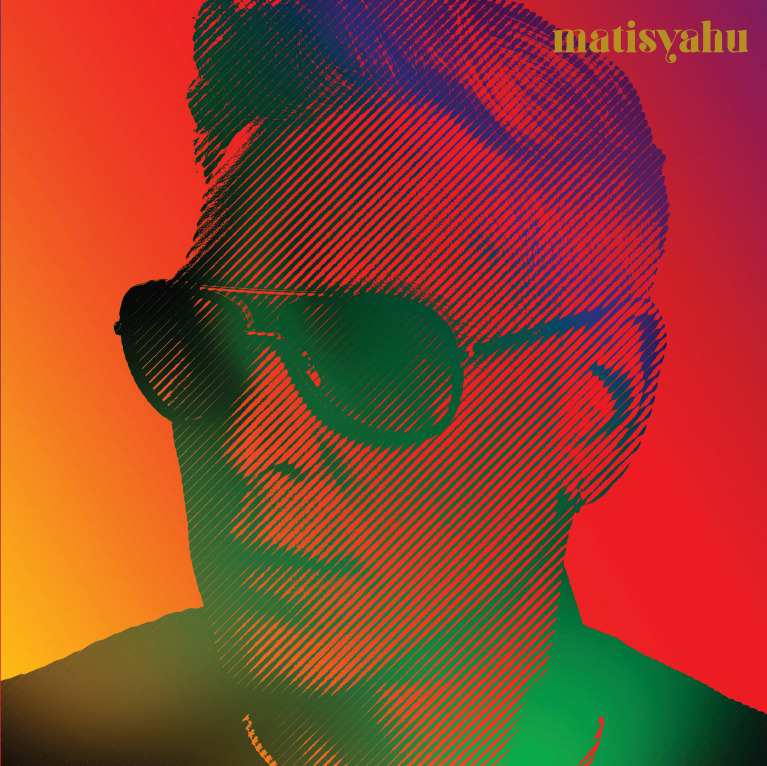
In 2006 Later with Jools, Holland introduced a unique artist most in the UK had never seen before: a young Jewish man from America in his mid-twenties wearing ultra-orthodox clothing who could beatbox, rap and sing songs with a unique blend of reggae, hip-hop and inventive pop. Whilst Matisyahu no longer wears ultra-orthodox garments and is now clean-shaven with dyed hair, his Jewish faith continues to guide him and influence his songwriting.
Matisyahu’s seventh self-titled LP sees him invite people of all faiths or none to see him make deft word plays on Hebrew vocabulary whilst being guided by King Solomon’s wisdom. By collaborating with the Columbian production duo and band Salt Cathedral (Juliana Ronderos and Nicolás Losada), Matisyahu has created an album with detailed, minimalist sound, which radiates euphoric, elating energy.
Some may interpret Matisyahu collaborating with female vocalist Juliana Ronderos on this LP as a lapse of faith and surrender to secularism. Matisyahu immediately dismisses this on the LP opener “Not Regular” as he sings “,, no I’m not regular, no I’m not secular….” Other songs, including “Lonely Day, “have retrospective halcyon themes, including playing with his Star Wars gun as a child, taking LSD, and writing at the Nuyorican Poets Café.
For many artists and listeners, having music in their lives is sacrosanct. A ross this self-titled offering, Matisyahu more than shows his gratitude for music in recent times and throughout his life. O “Music is the Anthem” Matisyahu describes music as “shelter from overexposure”. Likewise, on “When The Smoke Clears”, Matisyahu sensitively sings “, Music is the only thing in this crazy world that makes sense to me”. The power of music and how music helps Matisyahu continue to be authentic and reinvent himself is most adroitly detailed across the rhythmic “Chameleon”.
“AM_Rica”, which “roughly” translates to mean “Empty Nation” in Hebrew, is in many ways for the artist a “visual” of “modern America”. One can’t help but make comparisons to Alan Ginsberg’s America poem. Whilst Ginsberg describes the negativity and destructive impact of America on his mental health and creativity; Matisyahu suggests coping mechanisms and how one can “burn out negativity like radiation” and is hopeful by “try(ing) to write these wrongs, when writing these psalms, in the tradition of a king, like Solomon”.
Where “AM_Rica” sees comparisons with Ginsberg’s America, “Mama Please Don’t Worry” shares poetical similarities with Bob Dylan’s “It’s Alright, Ma (I’m Only Bleeding)”. Where Dylan is pessimistic across the lyrics “That he is not busy being born is busy dying” and “And if my thought-dreams could be seen they’d probably put my head in a guillotine”, Matisyahu is able to see the light and align himself to the elements in this world that will protect him as he ebulliently chants “not an army can stop me cause loves all around me”. The soundscape of “Mama Please Don’t Worry” is not only the most upbeat but also the most instant and infectious.
As well as inviting his ten-year-old son to join in on the vocals of “Got to See It All” and describe the wonders of being a father to his daughter Esti, Matisyahu also opens up about when he was a vulnerable teenager and needed help and guidance. Matisyahu does this best on the playout track “Raindance” when he embarked upon a wilderness therapy programme. He spent three days in the wilderness away from civilisation, lit a fire in a storm and danced. Whilst this experience may seem short-lived compared to Jack Kerouac’s 63 days as a fire lookout in the summer of 1956 on Desolation Peak, the authenticity and honesty of this experience are equally felt.
Matisyahu has proven he is a truly creative and innovative chameleon from his continuous physical transformation and musical innovation. This ability has earned him over half a billion streams and five million physical sales to date.



1 Trackback / Pingback